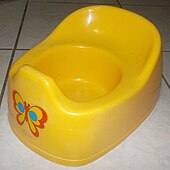Urine deflector

A urine deflector is a device for deflecting the stream of urine during urination. These may be part of a chamber pot, latrine or toilet intended for the purpose, or they may be deterrents, installed in the sides or corners of buildings to discourage their casual use as urinals by passers-by. They may be constructed in various ways from a variety of materials but are typically designed to have an angled surface which catches and redirects the stream.
Intentional design

Equipment used for toilet training such as a potty chair will typically include a urine deflector to ensure that the urine does not splash forward and outside the receptacle.[1]
Latrines constructed by the US Marines would contain urine deflectors made from sheet metal or tar paper. These would catch and direct the urine into a trough which would carry it to a separate drainage pit. This would minimise the unpleasant smell which typically results from decomposition and production of ammonia.[2] Other designs of latrine typically include similar urine deflectors to prevent degradation of the wooden components and the walls of the pit.[3]
Deterrent
Urine deflectors are thought to be the earliest example of hostile architecture. Such devices were common in the streets of London in the 19th century.[4] A correspondent to The Farmer's Magazine wrote in 1809,[5]
... in London a man may sometimes walk a mile before he can meet with a suitable corner; for so unaccommodating are the owners of door-ways; passages and angles, that they seem to have exhausted invention in the ridiculous barricadoes and shelves, grooved, and one fixed above another, to conduct the stream into the shoes of the luckless wight who shall dare to profane the intrenchments.
Some may still be found in places such as the Bank of England, Fleet Street and the Savoy.[6][7][8][9] Other cities where antique examples may still be seen include Lviv, Norwich and Venice.[10][11][12] In other cities such as Vienna, barriers such as iron railings and spikes have been used to keep people away from attractive corners and crannies.[6][13]
German cities such as Hamburg and Cologne have pioneered the use of hydrophobic paint on walls to deter Wildpinklers. This water-repellent coating causes the stream to rebound at a similar angle and so wet the offender. Other places such as Hackney, Manchester and San Francisco have since evaluated the method for particular trouble spots.[14][15] London's Soho district was painted in this way in 2022 and Westminster council's full programme of deterrence also included posters, punishment and provision of more public toilets.[16]
Gallery
-
Longshot of the Bank showing security camera directly above
-
Clifford's Inn Passage
-
in the Coach and Horses Passage in Newark-on-Trent
See also
References
- ^ Taree Bollinger; Patricia Cramer (1985), "Urine deflector", The Baby Gear Guide, Addison-Wesley, p. 153, ISBN 9780201106374
- ^ "Field Sanitation", Seabee Combat Handbook, United States Naval Education and Training Command, 1979, p. 307
- ^ Ernest Franklin Robinson (1917), Military Preparedness and the Engineer: A Handbook for the civilian engineer, p. 304
- ^ Lee Jackson (28 November 2014), Dirty Old London: The Victorian Fight Against Filth, Yale University Press, p. 157, ISBN 9780300210224
- ^ "On Human Exuvia and Soil-Holes", The Farmer's Magazine (XL), Edinburgh: Archibald Constable & Co.: 500, December 1809
- ^ a b c Roman Mars; Kurt Kohlstedt (2020), "Chapter 6 – Urine Trouble: Discouraging Spikes", The 99% Invisible City: A Field Guide to the Hidden World of Everyday Design, Hodder & Stoughton, ISBN 9781529355307,
An angled urine deflector on the Bank of England building occupies a promising niche...
- ^ Matt Brown (2017), "Urine Deflectors And Where To Find Them", Londonist
- ^ "Urine Deflectors of Fleet Street", Atlas Obscura
- ^ Robert Lordan (15 February 2015), "Cabbie's Curios: Victorian Relief", View from the Mirror
- ^ Areta Kovalska (2 May 2020), "Urine Deflectors of Lviv", Forgotten Galicia
- ^ Carly Hacon (12 May 2017), "Retired Norwich teacher's quirky theory about devices to stop people urinating in city streets", Eastern Daily Press
- ^ Waterman, Glennis (29 July 2012), "The stones of Venice", Doves Today
- ^ "Anti-Toilets in Vienna and Klosterneuburg", Shadows of a Forgotten World, 25 August 2015
- ^ Aisha Gani (27 November 2015), "Walls that 'pee back' tackle people who urinate in public", The Guardian
- ^ "It's 'peeback' time in Shoreditch and Dalston", Made in Shoreditch, 16 December 2015
- ^ Westminster council fighting public urination with 'splash back' paint, BBC News, 15 December 2022
- ^ Andy Bull (2019), Secret Ramsgate, Amberley Publishing, p. 35, ISBN 9781445692562

![Bank of England in Lothbury[6]](http://upload.wikimedia.org/wikipedia/en/thumb/8/8a/Urine_deflector_at_the_Bank_of_England.jpg/260px-Urine_deflector_at_the_Bank_of_England.jpg)





![Jacob's Ladder in Ramsgate which has deflectors in the corners of each landing[17]](http://upload.wikimedia.org/wikipedia/commons/thumb/5/55/Jacob%27s_Ladder%2C_Ramsgate_-_geograph.org.uk_-_1114415.jpg/400px-Jacob%27s_Ladder%2C_Ramsgate_-_geograph.org.uk_-_1114415.jpg)